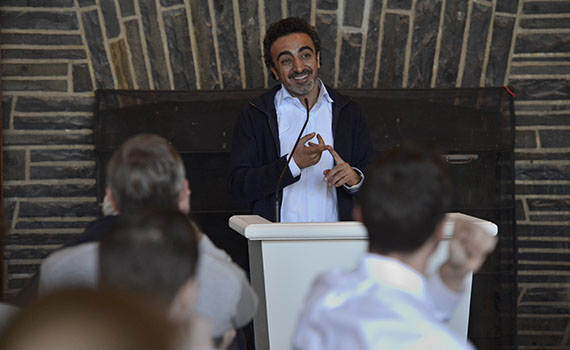The blue skies and bright sunshine over Whitnall Field mirrored the energy inside James C. ║¼ą▀▓▌蹊┐╦∙ Student Union on Saturday. More than 200 students, alumni, parents, and friends gathered in the Hall of Presidents to hear founder and CEO Hamdi Ulukaya tell his own entrepreneurship story.
The rich that Americans are buying at a rate of 1.8 million cases per week came from humble beginnings. Ulukaya purchased a defunct 90-year-old yogurt plant in New Berlin, N.Y., from Kraft Foods in 2005 and began producing small batches of his product, testing it and storing it for weeks and months to see if the quality would hold from trucking container to tabletop.
ThatŌĆÖs the story of Ulukaya the master yogurt maker, the Turkish kid who grew up in a small farming village, east of the Euphrates River. But thereŌĆÖs another narrative of Ulukaya the entrepreneur, who moved to Central New York and saw economic potential in a castoff factory.

Hamdi Ulukaya, founder and CEO of Chobani, addresses Entrepreneur Weekend attendees at lunch in the Hall of Presidents (Photo by Andy Daddio)
ŌĆ£The first thing I did when I started this journey was that I realized that I didnŌĆÖt know much. I would make meetings with bankers or engineers, and ninety percent of the things they were trying to tell me ŌĆö I had no idea with they were talking about.ŌĆØ He could fake it and figure it out, or he could ask questions.
Ulukaya chose to be himself. ŌĆ£The best thing I did was to say, ŌĆśTell me a simpler way to understand.ŌĆÖŌĆØ
After 18 months of asking questions and testing cultures, the first 300 cases of went to a kosher store on Long Island, and UlukayaŌĆÖs future hung in the balance for a week as he waited for a sales report. Returns were positive enough to require a second shipment of 300 cases. The order came with good news: customers were encouraging others to buy this new yogurt, too.
ŌĆ£At that point, I knew this wasnŌĆÖt going to be about selling; it was going to be about making. And the big guys were going to hear about this. They were going to kill me,ŌĆØ he said, referencing the long-established yogurt producers.
But Ulukaya had done his homework. Before he went to market, he interviewed shoppers at the dairy case and found out that they were mixing fruit into plain nonfat Greek yogurt because the leading brand only offered fruit with full-fat. So he flipped the equation and made his fruit flavors nonfat.
Then, Ulukaya bucked the traditional approach to distribution. Instead of putting his yogurt into smaller local stores, he went directly to the national chains. It was more expensive, and Ulukaya didnŌĆÖt have the resources to pay the $200,000 that his first buyer demanded to sell Chobani. So Ulukaya bet the farm. ŌĆ£We told them we would pay them in yogurt. And what if it doesnŌĆÖt sell?ŌĆØ he remembered. ŌĆ£We told them weŌĆÖd give them the plant.ŌĆØ
The gamble paid off, and UlukayaŌĆÖs nontraditional, disruptive arrival shook the dairy industry. ŌĆ£I realized that those big guys ŌĆö theyŌĆÖre not that clever,ŌĆØ he said. ŌĆ£ItŌĆÖs a very old way of doing business. ItŌĆÖs very slow, and they donŌĆÖt react very fast.ŌĆØ
Now, Ulukaya and Chobani are expanding to stay ahead of the competition, taking care not to be slowed by the weight of their success. ŌĆ£We never sit and wonder what weŌĆÖre going to do next,ŌĆØ he said, ŌĆ£Being in the action of doing, it comes.ŌĆØ
Some ║¼ą▀▓▌蹊┐╦∙ students, alumni, and parents will find lessons in the story of Ulukaya the Turkish dairyman, others in Ulukaya the entrepreneur. For ChobaniŌĆÖs CEO, who will receive an honorary doctorate from ║¼ą▀▓▌蹊┐╦∙ this May, the past five years have been a course in self-awareness.
ŌĆ£I had no idea I was a marketer, a finance guy, a leader,ŌĆØ he said. ŌĆ£I got to learn myself and the people I work with. I learned what makes this country so great ŌĆö the passion and the belief.ŌĆØ